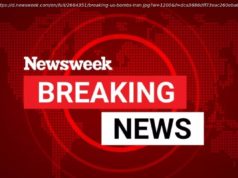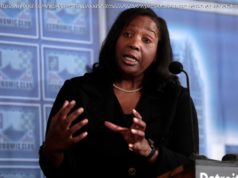President Donald Trump opened a summit of NATO allies here Tuesday by blasting Germany as a “captive of Russia” and failing to meet its commitments to the alliance in what is expected to be the most contentious meeting of allies in years.
BRUSSELS — President Donald Trump opened a summit of NATO allies here Tuesday by blasting Germany as a “captive of Russia” and failing to meet its commitments to the alliance in what is expected to be the most contentious meeting of allies in years.
A trans-Atlantic showdown is now underway at NATO headquarters in Brussels, where gathering heads of state are facing intense pressure to ramp up military spending.
“They have to step it up immediately. Germany is a rich country. We are not going to put up with it,” Trump said during an opening meeting with NATO Secretary-General Jens Stoltenberg.
Trump, flanked by a stone-faced Defense Secretary Jim Mattis and Secretary of State Mike Pompeo, also criticized a multibillion dollar energy deal between Moscow and Berlin that he says NATO “needs to look at.”
“Germany is a captive of Russia,” Trump said.
In the buildup to NATO’s annual summit, Trump has delivered one rhetorical assault on the alliance after another as he hammers members for not spending enough on their militaries. In doing so, Trump also has said the U. S. benefits less from the military pact than Europe, which has fostered doubts about his commitment to collective defense.
Trump’s messages have roiled the 70-year-old alliance, where concerns about the president’s commitment to the future of NATO are now at a near-panic level in parts of Europe.
NATO Secretary-General Jens Stoltenberg said his goal for the summit is to keep allies unified despite their differences.
“There are disagreements and different views, and I expect actually also honest and frank discussions during the summit,” Stoltenberg told reporters Monday. “But I strongly believe that NATO can continue to be the cornerstone of trans-Atlantic security.”
To quell doubts about American commitment to NATO and security in Europe, the U. S. Senate on Monday voted 97-2 to reaffirm the country’s commitment to the alliance.
Still, Trump’s ambivalence about NATO and an upcoming meeting with Russian President Vladimir Putin that Trump said would be the “easiest” of meetings on his European tour has caused consternation.
In Brussels, think tanks with a pro-NATO bent have assembled on the sidelines of the summit to mount a defense of the alliance’s values and the role it plays in global security.
The overall anxiety was captured in a July 9 open letter to heads of state by scores of former alliance officials that included former NATO supreme allied commanders Philip Breedlove, James Stavridis and other generals and diplomats.
“NATO is at a crucial decision point,” the letter stated. “If NATO were to fail because of short-term political frictions, the loss would not only be felt by the allies but by freedom-loving peoples the world over, as they could no longer rely on this anchor of legitimate security.”
During the two-day summit, allies are expected to finalize plans to build two new commands — one in Germany and the other in the U. S. — to ensure that their militaries can quickly deploy forces across land and sea borders in a crisis.
To improve combat readiness, participants also will adopt the so-called “Four Thirties” initiative that calls for 30 mechanized battalions, 30 air squadrons, and 30 combat vessels to be ready for deployment within 30 days.
The moves are a continuation of reform inside NATO brought on by Russia’s 2014 intervention in Ukraine, which sparked the alliance’s largest military reinforcement since the end of the Cold War.
Allies also will agree to launch a new training mission in Iraq that will involve sending hundreds of military trainers to the country.
Nevertheless, defense spending will dominate discussions behind the scenes.
Stoltenberg said Monday that allies are going in the right direction. In 2017, members posted the largest collective defense spending increase since the end of the Cold War and eight member states are expected to meet NATO spending benchmarks in 2018, he said.
“I would like to thank President Trump for his leadership on defense spending,” Stoltenberg said. “It is clearly having an impact.”
However, nearly half of allies still do not have concrete plans for dedicating 2 percent of GDP to their respective militaries, a target agreed upon by NATO in 2014. Another point of contention is that economic powerhouse Germany is among those still falling short, even though Berlin has stated it will ramp up defense spending 80 percent by 2025.
Trump has repeatedly highlighted Germany’s trade surplus with the U. S. and its lack of defense contributions as evidence of American taxpayers getting taken advantage of.
“We are the schmucks who pay for the whole thing,” Trump said last week.
vandiver.john@stripes.com
Twitter: @ john_vandiver






